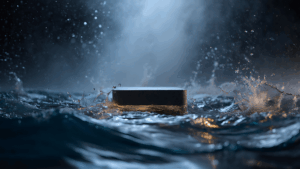All water is recycled, but there are some parts of the water recycling process we don’t want to think about. The process that people term ‘toilet to tap’.
Tell someone the water in their glass is purified and they’ll think it’s delicious. Tell them it’s recycled water from toilets and that same glass of water will suddenly seem deeply unappetising. But it’s all the same thing. We’re essentially drinking the same water that dinosaurs did – and, yes, the dinosaurs also excreted that water in the same way that every animal, including humans, does.
In the past, clean water that has been treated in sewage works has been released into rivers – known as ‘indirect potable water’. But in 1998, Singapore trailed a new initiative that put water recovered from wastewater through extra treatment processes using advanced dual-membrane and ultraviolet technologies and released it directly into the drinking water supply. Hence the term ‘toilet to tap’. Since then, other countries facing shortages of potable water have followed suit.
How is the water purified?
Once the water has been through the usual sewage treatment process, instead of being returned to the rivers, it undergoes advanced purification. Firstly, microorganisms are reduced by filtering the water through membrane bioreactors. It then undergoes reverse osmosis which removes 99% of water impurities. The final treatment exposes the water to ultraviolet light, which gets rid of any remaining chemicals or viruses.
Why is there resistance to the toilet to tap process?
You don’t have to be a scientist to realise the phrase ‘toilet to tap’ conjures up a somewhat unpleasant mental image. So, when toilet to tap solutions were suggested as a way of helping drought-stricken areas of the United States at the beginning of this century, there was a lot of opposition from the public. So much so in fact that psychologists were brought in to help sell the concept to the public and overcome the ‘yuck’ factor.
The psychologists noted that in Singapore, any public concern or revulsion about reclaimed water had been overcome with a public information campaign that explained how it works and emphasised the economic benefits it would bring. The authorities pointed out it would reduce the country’s dependence on water taken from neighboring Malaysia’s rivers. They also called the water ‘NEWater’, which helped dissociate it from the word ‘toilet’.
Why do we even need to consider toilet to tap?
A combination of a rising population and the effects of climate change is bringing us ever closer to a ‘Day Zero’ drought. This is the point at which the amount of potable water available cannot meet demand. This is a global problem, and there is no doubt that it will affect parts of the UK unless we do something to prevent it – the south-east of England is drier than you think, and London could be suffering water supply shortages by as early as 2040.
It is estimated that recovered wastewater can provide 90% of our potable water which makes it a highly desirable way of quenching the thirst of countries facing shortages and drought. On the surface, we may find the thought unpalatable, but recycling wastewater produces a plentiful supply of clean, potable water that could save lives.
Save water, save money
Despite the decreasing availability of potable water, water usage is growing as a result of a global population increase and rise in consumer products. It is therefore important do what you can to make better use of business water. Water efficiency is a crucial part of your business strategy. Not only will saving water ultimately save your business money, it will also help your business to reach its sustainability goals.



